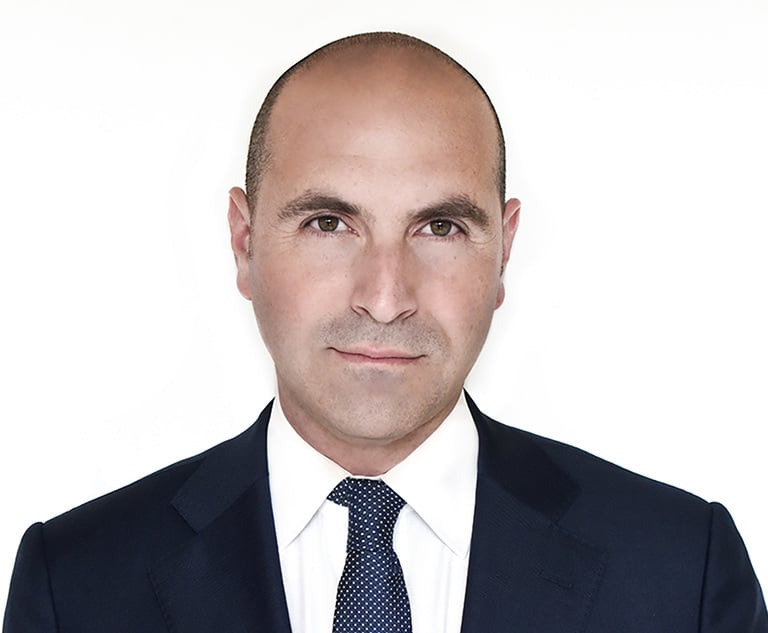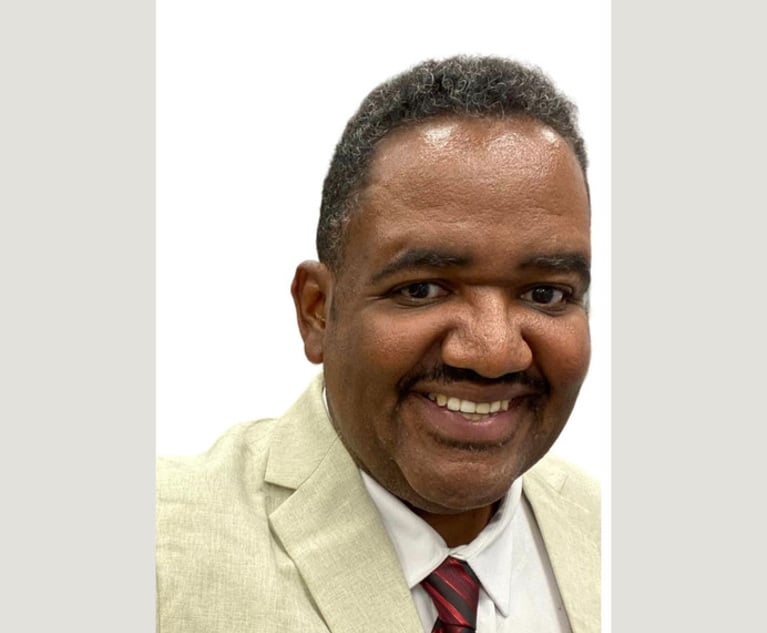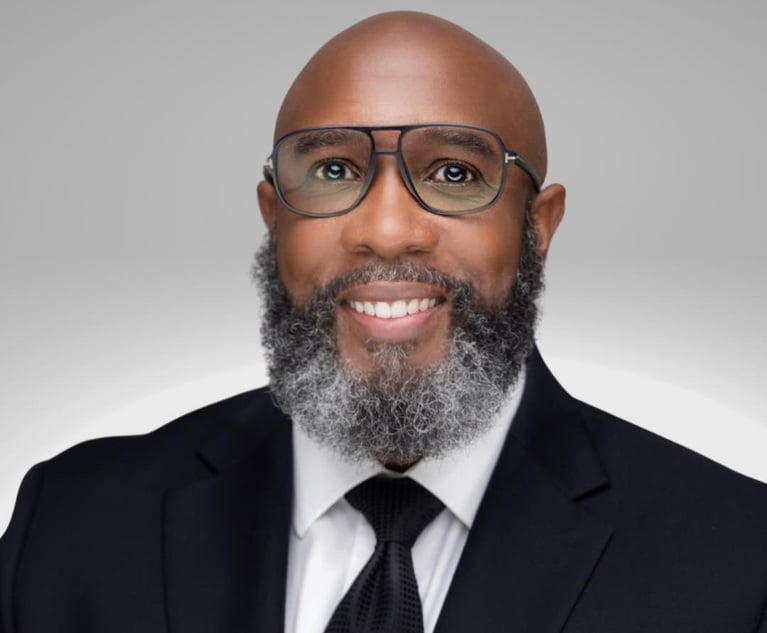 Edward J. O'Sheehan, partner with Shutts & Bowen, in Fort Lauderdale. Courtesy photo.
Edward J. O'Sheehan, partner with Shutts & Bowen, in Fort Lauderdale. Courtesy photo.'A Totally New Mission': How Army Lawyer Edward O'Sheehan Helped With COVID-19 Response
A former U.S. Marine, O'Sheehan serves as a judge advocate general and senior defense counsel for the Florida National Guard, which teamed with the Army Corps of Engineers for the effort.
May 29, 2020 at 04:01 PM
7 minute read
Being an army lawyer in South Florida usually means all hands on deck when a hurricane hits. But this time, for Edward O'Sheehan of Shutts & Bowen's Fort Lauderdale office, it meant bracing for a pandemic.
While the public were ordered to stay at home, Col. O'Sheehan was helping transform the Miami Beach Convention Center into a 450-bed COVID-19 field hospital and helping establish testing sites at C.B. Smith Park, Hard Rock Stadium, Marlins Park and Amelia Earhart Park. They also sent teams to nursing homes to test residents and staff.
A former U.S. Marine, O'Sheehan serves as the staff judge advocate for the Florida National Guard, which teamed with the U.S. Army Corps of Engineers for the effort.
It's been quite an adjustment, according to O'Sheehan, and involved collaborating with multiple agencies at different sites, including the Federal Emergency Management Agency, the Florida Divison of Emergency Management, city managers and mayors.
"If a hurricane hits, we know what to do. We're used to doing that. This is a totally new mission. We've never done anything like a pandemic," O'Sheehan said. "We haven't done this since, I think, the Spanish flu of 1918, so everybody's learning as we go."
O'Sheehan likens his role to general counsel as he accompanied the task-force commander, a colonel, to meetings where he'd help him manage risk, review guides from the Centers for Disease Control and Prevention, help set up credentials for staff at the pop-up hospital and probe medical personal about next steps, testing kits, manuals and methodology.
"I felt like I was doing cross examination of an expert witness," he said.
 O'Sheehan of Shutts of Bowen at the Miami Beach Convention Center COVID-19 field hospital under construction by the Army Corps of Engineers. Courtesy photo.
O'Sheehan of Shutts of Bowen at the Miami Beach Convention Center COVID-19 field hospital under construction by the Army Corps of Engineers. Courtesy photo.
There was plenty to worry about.
"How do we keep our soldiers and airmen safe if we're swabbing people, if we're going into nursing homes? Or, on the other hand, especially going into nursing homes, how do we make sure when we go in there we're not infecting them, we're not bringing anything bad in?" O'Sheehan said. "Safety is a huge thing, and I think we've done a good job of having people who speak different languages. And the military and the state people that we're working with have done a great job of making it organized and safe."
O'Sheehan said it was touch-and-go for a while whether sites would have enough personal protection equipment from one day to the next, but supplies have since ramped up.
"We spent a lot of time in the middle of the night moving things around to make sure each site has enough for the next day, but we never had to shut down," he said.
 Edward O'Sheehan (right) and a colleague working in a tactical operations center van. Courtesy photo.
Edward O'Sheehan (right) and a colleague working in a tactical operations center van. Courtesy photo.
For O'Sheehan, it also meant thinking twice about everything, as even small adjustments can pose big challenges. When the Hard Rock testing center noticed many drivers were bringing kids with them, for instance, Operation Teddy Bear commenced.
"It was a great idea, give kids teddy bears, but you don't want to give somebody a COVID-infected teddy bear," O'Sheehan said. "In the time of COVID, they had to come up with a safe way to disinfect the teddy bears and double wrap them in bags."
O'Sheehan has clocked 35 years in the military, where he specialized in electronics for helicopters, handled multiple courts-martial and was deployed in Afghanistan for 15 months. He spent the last six months of duty on a Navy ship in the middle of the Mediterranean, keeping helicopters flying and "living in cramped, cramped quarters with many people."
|Welcome to Miami: here's a hurricane
inspired by legal stories from his wife's uncle, a judge, and a lawyer he met as an undergrad, O'Sheehan joined an Ohio legal aid agency to work on landlord-tenant, social security and disability cases.
With a bachelor's degree in hand, O'Sheehan set his sights on the University of Miami for law school, but his timing wasn't ideal.
"When I got to UM, they were putting up plywood, taping up all the windows," O'Sheehan said. "That's when I found out the hurricane was coming. I didn't even have an apartment."
It was Aug. 21, 1992, three days before Category 5 Hurricane Andrew made landfall, so O'Sheehan scrambled to find an apartment in Miami Beach, threw his stuff in it and drove to his in-laws' home in North Miami.
HIs Florida experience improved from there.
An economics major, O'Sheehan planned on being a transactional corporate tax attorney until he bumped into a group of excitable commercial litigators while studying late one night. Having just returned from trial, they needed help with legal research on then-new databases LexisNexis and Westlaw.
"They kept me there until 11 o'clock at night helping them do research for trial for the next day, and they were so excited and having such a good time planning and talking about witnesses and their arguments," O'Sheehan said. "Then I found some case from Texas and they all went crazy because it said exactly what they needed to argue the next day."
Realizing litigators were having all the fun, O'Sheehan switched tracks and joined an insurance defense firm the following summer.
Now a member of Shutts & Bowen's business litigation practice group and chair of its pro bono committee, O'Sheehan has found litigation isn't all that different from the Marines, where he was trained not to be afraid of confrontation.
"You're always planning to train to fight somebody," O'Sheehan said. "In court, you're not shooting people but you're still fighting strategy with your mind."
But just as important as the litigation strategy, O'Sheehan has learned, is to go and visit client's businesses.
"Spend some time there, walk around, see it and then you have a better understanding of why they think it's so legitimate to fight over something, why they believe in their position so strongly that they'd actually pay lawyers a lot of money to deal with it," he said.
Dan Matlow of Tobin Reyes in Hollywood described O'Sheehan as loyal, humble and fearless lawyer with an unfathomable schedule.
"I don't think Ed sleeps," Matlow said. "He works like a dog at the law firm and then he spends his weekends doing reserve duty, and then he'll tell you that he went to the beach to do a beach cleanup, then he went to church."
Matlow says he often reviews attorney fee requests for O'Sheehan, who apparently always tells him, "Hey, if you think I wasn't efficient somewhere, I want your honest opinion. I don't want you to just be a rubber stamp."
When he's not litigating, O'Sheehan still has to do push-ups and sit-ups for his Army training, and spends his downtime scuba diving, fishing, biking and running.
Edward J. O'Sheehan
Born: June 1965, Buffalo, New York
Spouse: Heidi O'Sheehan
Children: Evan, Oona and Isaac
Education: University of Miami, J.D.,1995; Ohio University, B.A. in economics, 1992
Experience: Partner/associate, Shutts & Bowen, 1998-2000, 2001-present; In-house litigation counsel, AutoNation Inc., 2000-2001; Associate, Goldber & Young, 1997-1998; Associate, Esler, Petrie & Salkin, 1995-1997; Judge Advocate General Corps Officer, Florida Army National Guard, 1996-present.
More profiles:
This content has been archived. It is available through our partners, LexisNexis® and Bloomberg Law.
To view this content, please continue to their sites.
Not a Lexis Subscriber?
Subscribe Now
Not a Bloomberg Law Subscriber?
Subscribe Now
NOT FOR REPRINT
© 2024 ALM Global, LLC, All Rights Reserved. Request academic re-use from www.copyright.com. All other uses, submit a request to [email protected]. For more information visit Asset & Logo Licensing.
You Might Like
View All
Growing Referral Network, Alternative Fees Have This Ex-Big Law’s Atty’s Bankruptcy Practice Soaring
5 minute read
Against the Odds: Voters Elect Woody Clermont to the Broward Judicial Bench
4 minute read
Miami Civil Judge Myriam Lehr to Say Goodbye to the County Court Bench
4 minute readLaw Firms Mentioned
Trending Stories
- 1Judicial Ethics Opinion 24-89
- 2It's Time To Limit Non-Competes
- 3Jimmy Carter’s 1974 Law Day Speech: A Call for Lawyers to Do the Public Good
- 4Second Circuit Upholds $5M Judgment Against Trump in E. Jean Carroll Case
- 5Clifford Chance Hikes Partner Pay as UK Firms Fight to Stay Competitive on Compensation
Who Got The Work
Michael G. Bongiorno, Andrew Scott Dulberg and Elizabeth E. Driscoll from Wilmer Cutler Pickering Hale and Dorr have stepped in to represent Symbotic Inc., an A.I.-enabled technology platform that focuses on increasing supply chain efficiency, and other defendants in a pending shareholder derivative lawsuit. The case, filed Oct. 2 in Massachusetts District Court by the Brown Law Firm on behalf of Stephen Austen, accuses certain officers and directors of misleading investors in regard to Symbotic's potential for margin growth by failing to disclose that the company was not equipped to timely deploy its systems or manage expenses through project delays. The case, assigned to U.S. District Judge Nathaniel M. Gorton, is 1:24-cv-12522, Austen v. Cohen et al.
Who Got The Work
Edmund Polubinski and Marie Killmond of Davis Polk & Wardwell have entered appearances for data platform software development company MongoDB and other defendants in a pending shareholder derivative lawsuit. The action, filed Oct. 7 in New York Southern District Court by the Brown Law Firm, accuses the company's directors and/or officers of falsely expressing confidence in the company’s restructuring of its sales incentive plan and downplaying the severity of decreases in its upfront commitments. The case is 1:24-cv-07594, Roy v. Ittycheria et al.
Who Got The Work
Amy O. Bruchs and Kurt F. Ellison of Michael Best & Friedrich have entered appearances for Epic Systems Corp. in a pending employment discrimination lawsuit. The suit was filed Sept. 7 in Wisconsin Western District Court by Levine Eisberner LLC and Siri & Glimstad on behalf of a project manager who claims that he was wrongfully terminated after applying for a religious exemption to the defendant's COVID-19 vaccine mandate. The case, assigned to U.S. Magistrate Judge Anita Marie Boor, is 3:24-cv-00630, Secker, Nathan v. Epic Systems Corporation.
Who Got The Work
David X. Sullivan, Thomas J. Finn and Gregory A. Hall from McCarter & English have entered appearances for Sunrun Installation Services in a pending civil rights lawsuit. The complaint was filed Sept. 4 in Connecticut District Court by attorney Robert M. Berke on behalf of former employee George Edward Steins, who was arrested and charged with employing an unregistered home improvement salesperson. The complaint alleges that had Sunrun informed the Connecticut Department of Consumer Protection that the plaintiff's employment had ended in 2017 and that he no longer held Sunrun's home improvement contractor license, he would not have been hit with charges, which were dismissed in May 2024. The case, assigned to U.S. District Judge Jeffrey A. Meyer, is 3:24-cv-01423, Steins v. Sunrun, Inc. et al.
Who Got The Work
Greenberg Traurig shareholder Joshua L. Raskin has entered an appearance for boohoo.com UK Ltd. in a pending patent infringement lawsuit. The suit, filed Sept. 3 in Texas Eastern District Court by Rozier Hardt McDonough on behalf of Alto Dynamics, asserts five patents related to an online shopping platform. The case, assigned to U.S. District Judge Rodney Gilstrap, is 2:24-cv-00719, Alto Dynamics, LLC v. boohoo.com UK Limited.
Featured Firms
Law Offices of Gary Martin Hays & Associates, P.C.
(470) 294-1674
Law Offices of Mark E. Salomone
(857) 444-6468
Smith & Hassler
(713) 739-1250







